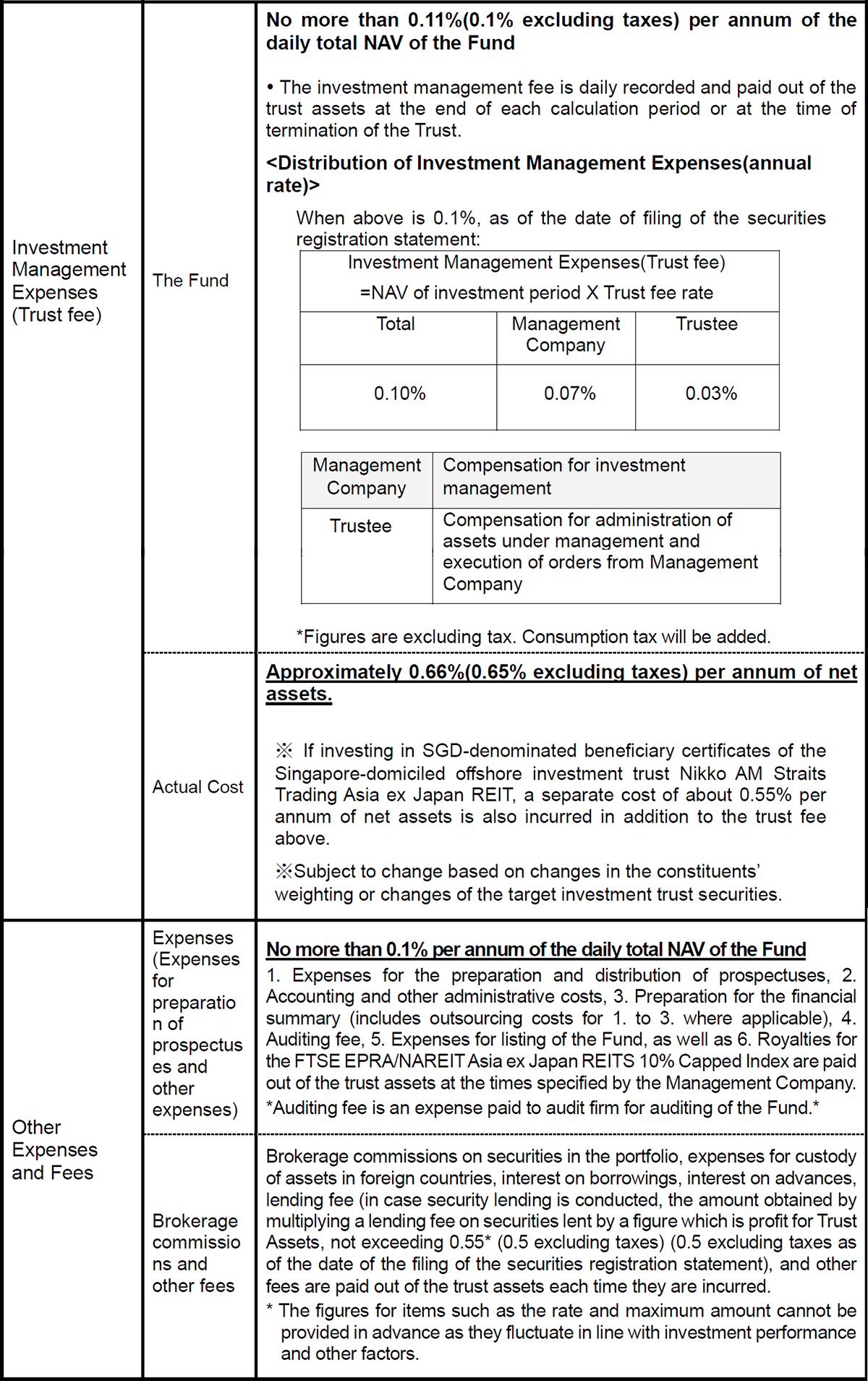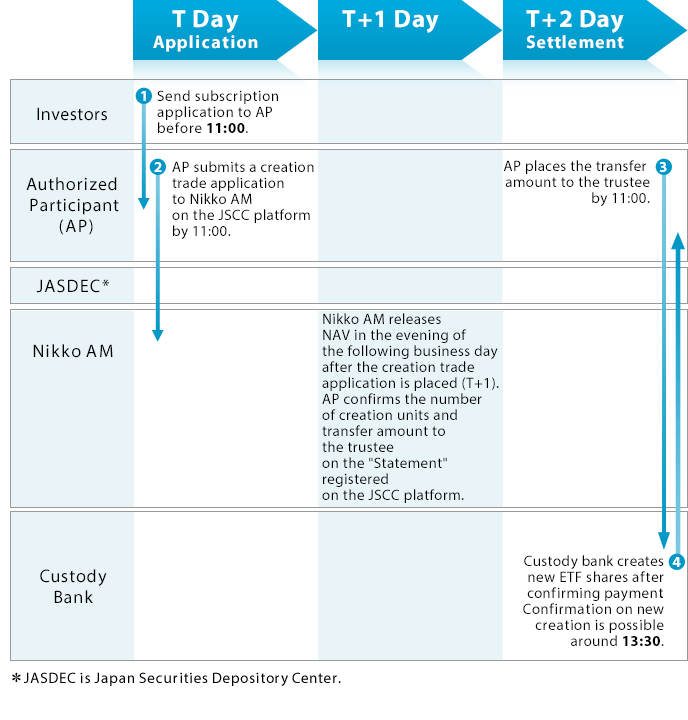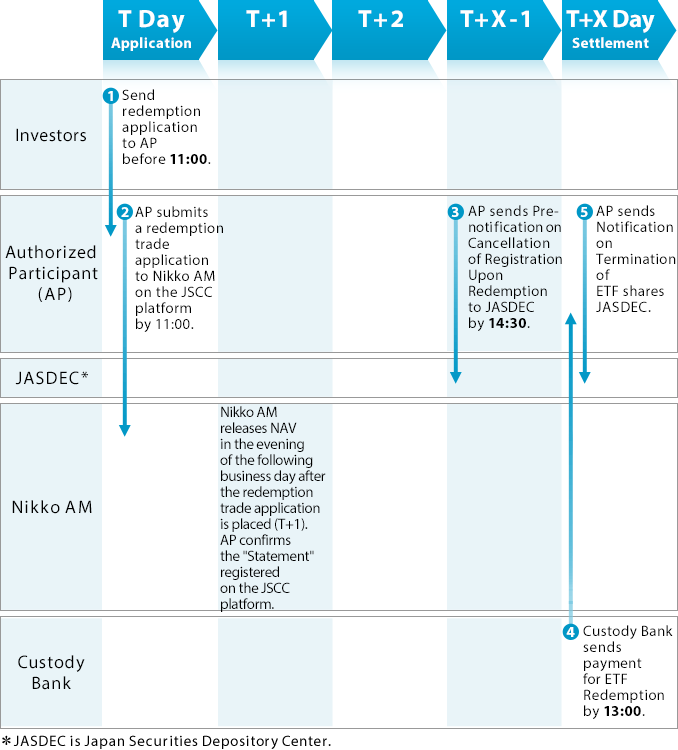On September 1, 2025, Nikko Asset Management Co., Ltd. will change its name to Amova Asset Management Co., Ltd.
The Fund invests primarily in SGD-denominated beneficiary certificates of the Singapore-domiciled offshore investment trust Nikko AM Straits Trading Asia ex Japan REIT*. It is managed with the aim of matching the rate of change in the net asset value per unit with the rate of change in the yen-converted FTSE EPRA/NAREIT Asia ex Japan REITS 10% Capped Index.
*Nikko AM Straits Trading Asia ex Japan REIT will change its name to “Amova Straits Trading Asia ex Japan REIT” on September 1, 2025.
Key information
| Name: | Listed Index Fund Asian REIT | |
| Code: | 1495 |
Net Asset Value and Performance
| Fund Name | Listed Index Fund Asian REIT Open-end/Overseas/REITs/ETF/Index type |
| Listed Exchange | Tokyo Stock Exchange |
| Issue Code | 1495 |
| Targeted Investments | This fund aims to achieve investment returns that link with the movement of the yen-converted FTSE EPRA/NAREIT Asia ex Japan REITS 10% Capped Index. |
| Date Listed | 29 June 2017 |
| Exchange Trading Unit | 1 unit |
| Trust period | Unlimited (launch date: June 22, 2017) |
| Computation Period | From 21 January to 20 April, 21 April to 20 July, 21 July to 20 October of each year, and from 21 October to 20 January of the following year |
| Closing Date | 20th of January, April, July and October every year |
| Dividends | As a general rule, the full amount of dividends and other income arising from the trust assets is distributed after deduction of expenses. *There is no guarantee on the payment or the amount of dividend. |
Fund Expenses
■Expenses to be borne directly by investors
| Subscription Fee | Independently set by Distributors *Please contact your Distributor for further information. *Subscription Fee is compensation for explanation and information providing about the Fund or investment environment, and is also including expense of clerical processing of the subscription. |
| Exchange Fee | Independently set by Distributors *Please contact your Distributor for further information. *Exchange Fee is compensation for clerical processing of the exchange. |
| Amount to be Retained in Trust Assets | None. |
■Costs paid indirectly by the customer for the trust assets (paid from the fund)
| TER (Total Expense Ratio) |
0.74% (TER includes Trust Fee, management fee and other costs below) Please refer to the prospectus for details. |

The total amount of expenses of the Fund to be borne by investors varies according to holding length and investment status, and thus cannot be shown.
Investment Restrictions
|
Trustee Companies
|
The FTSE EPRA/NAREIT Asia ex Japan REITS 10% Capped Index is published by the FTSE as an index of the weighted average of the market capitalization of investment income (and equivalent securities) of listed REITs in Asian countries except Japan. Weightings of individual names are limited to a maximum of 10% when rebalancing is performed.
Constituent names and weightings are reviewed in March, June, September and December every year.
Further Information
Japan Exchange Group (JPX)
Japan Exchange Group publishes summaries and lists of the ETFs, as well as other valuable information on their website.
S&P Global
- Listed ETF iNav
Please click this link to see the iNAV.
FTSE Group
*Link to external sites.
Copyright
The FTSE EPRA/NAREIT Asia ex Japan REITS 10% Capped Index are not in any way sponsored, endorsed, sold or promoted by FTSE International Limited (“FTSE”), by the London Stock Exchange Group companies (“LSEG”), Euronext N.V. (“Euronext”), European Public Real Estate Association (“EPRA”), or the National Association of Real Estate Investment Trusts (“NAREIT”) (together the “Licensor Parties”) and none of the License Parties make any warranty or representation whatsoever, expressly or impliedly, either as to the results to be obtained from the use of the FTSE EPRA/NAREIT Asia ex Japan REITS 10% Capped Index ("the Index') and/or the figure at which the said Index stands at any particular time on any particular day or otherwise. The Index is compiled and calculated by FTSE. However, none of the Licensor Parties shall be liable (whether in negligence or otherwise) to any person for any error in the Index and none of the License Parties shall be under any obligation to advise any person of any error therein.
“FTSE®” is a trade mark of LSEG, “NAREIT®” is a trade mark of the National Association of Real Estate Investment Trusts and “EPRA®” is a trade mark of EPRA and all are used by FTSE under license.
- 5 Mar 2025 — Earnings Report for Fiscal Year ended Jan 2025
- 2 Sep 2024 — Earnings Report for Fiscal Year ended Jul 2024
- 4 Mar 2024 — Earnings Report for Fiscal Year ended Jan 2024
- 1 Sep 2023 — Earnings Report for Fiscal Year ended Jul 2023
- 3 Mar 2023 — Earnings Report for Fiscal Year ended Jan 2023
- 2 Sep 2022 — Earnings Report for Fiscal Year ended Jul 2022
- 4 Mar 2022 — Earnings Report for Fiscal Year ended Jan 2022
- 2 Sep 2021 — Earnings Report for Fiscal Year ended Jul 2021
- 5 Mar 2021 — Earnings Report for Fiscal Year ended Jan 2021
- 2 Sep 2020 — Earnings Report for Fiscal Year ended Jul 2020 (21 Jan 2020 – 20 Jul 2020)
- 4 Mar 2020 — Earnings Report for Fiscal Year ended Jan 2020 (21 Jul 2019 - 20 Jan 2020)
- 2 Sep 2019 — Earnings Report for Fiscal Year ended Jul 2019 (21 Jan 2019 – 20 Jul 2019)
- 5 Mar 2019 — Earnings Report for Fiscal Year ended Jan 2019 (21 Jul 2018 - 20 Jan 2019)
- 31 Aug 2018 — Earnings Report for Fiscal Year ended Jul 2018 (21 Jan 2018 – 20 Jul 2018)
- 5 Mar 2018 — Earnings Report for Fiscal Year ended Jan 2018 (21 Jul 2017 - 20 Jan 2018)
- 31 Aug 2017 — Earnings Report for Fiscal Year ended Jul 2017 (22 June 2017 - 20 Jul 2017)
A unit stock is a unit in a stock basket that an investor applying for an acquisition through addition contributes to. A unit stock is also a unit in a stock basket that an investor who applies for an exchange receives in trade for a beneficial interest.
This Fund can be applied for as a direct addition and exchange at Authorised Participants in addition to the Tokyo Stock Exchange. In this case, "unit stock" is referred to as a unit. When applying as a direct addition and exchange, please keep in mind that we cannot accept your application on the following dates:
Authorized Participants
- SMBC Nikko Securities Inc.
- ABN AMRO Clearing Tokyo Co., Ltd.
- Barclays Securities Japan Limited
- BNP Paribas Securities (Japan) Limited
- Citigroup Global Markets Japan Inc.
- Goldman Sachs Japan Co.,Ltd.
- Mitsubishi UFJ Morgan Stanley Securities Co., Ltd.
- Mizuho Securities Co., Ltd.
- Nomura Securities Co., Ltd.
- Phillip Securities Japan, Ltd.
Daily Creation and redemption are based on ETF's NAV calculated in early evening. Confirm non-tradable days by referring to trading calendar on our official homepage. Basket for creation is continually-updated on our official homepage.
Basically sell/buy underlying asset at last price of T day's market.
The flow chart below is showing the creation/redemption process for Nikko AM ETFs. Please note that transactions cannot be processed for days on which applications are not accepted.
Creation Flow for Cash Creation/Redemption Type ETFs

Redemption flow for Cash Creation/Redemption Type ETFs

Investors are not guaranteed the investment principal that they commit. Investors may incur a loss and the value of their investment principal may fall below par as the result of a decline in NAV. All profits and losses arising from investments in the Fund belong to the investors (beneficiaries). This fund is different from saving deposit.
The Fund invests primarily in REITs, in essence, by investing in SGD-denominated beneficiary certificates of the Singapore-domiciled offshore investment trust Nikko AM Straits Trading Asia ex Japan REIT. Therefore, the NAV of the Fund may fall and you may suffer a loss for reasons such as a drop in the price of REITs or deterioration in the financial conditions and business performance of an issuer of REITs, deterioration in real estate market, etc. Losses may also be incurred due to exchange rate fluctuation when investing in assets denominated in foreign currencies.
Major risks are as follows:
1. Price Fluctuation Risk
The Singapore-domiciled offshore investment trust Nikko AM Straits Trading Asia ex Japan REIT, in which the Fund invests, is impacted by fluctuations in the FTSE EPRA/NAREIT Asia ex Japan REITS 10% Capped Index, which it tracks as its
target index. There is a risk that, if the FTSE EPRA/NAREIT Asia ex Japan REITS 10% Capped Index falls, the price of the beneficiary certificates in which the Fund invests
will also fall, causing losses in the Fund.
The source of revenue in real estate investment trusts comes from income and capital gains by way of investment in real estate and real estate securitization products. Prices will fluctuate due to various factors, such as regulations on the real estate environment, rent levels, occupancy rates, trends in the real estate market and long and short-term interest rates, or changes in the macro economy. There is also the possibility that prices will be affected by losses and damage to real estate resulting from deterioration, changes in location’s condition, fire or natural disaster. There is a risk that the Fund will incur losses due to a decrease in dividends and prices of real estate investment trusts if there is deterioration in their financial standing, or worsening performance and market conditions.
2. Liquidity Risk
Where the market size or trading volume is small, buying and selling prices for securities may be
largely affected. This results in the risk that securities cannot be traded at the expected prices, sold
at the appraised prices, or that trading volume is limited regardless of prices. This creates the risk
of unexpected losses.
There is a risk that, if SGD-denominated beneficiary certificates of the Singaporedomiciled offshore investment trust Nikko AM Straits Trading Asia ex Japan REIT are delisted from the Singapore Securities Exchange, or if there is concern that this may happen, management of the Fund will be obstructed.
3. Credit Risk
There is a risk that this Fund will incur material losses in the event that the real estate investment trusts are in a state of insolvency or excessive debt or if it is expected that such a situation will arise.
4. Currency Fluctuation Risk
For foreign-currency-denominated assets, in general, if the yen is stronger than the currencies of such assets, the Fund's NAV will decline.
5.Country Risk
There is the risk of significant losses in the Fund due to market trends or the flow of funds,
including state of emergencies in invested countries (such as financial crises, government
default due to financial reasons, significant policy changes or introductions of new regulations
including asset freezes, natural disasters, coups or significant political changes, or war). In
such cases, it is possible that the fund cannot be managed in accordance with the investment
policy.
Emerging countries in general tend to be insufficient or slow in information disclosure or in the dispatch of accurate information, when compared to advanced countries.
6.Security-lending Risk
Lending of securities is accompanied by counterparty risks, which are the risks of default or
cancellation of lending agreements as result of bankruptcy, etc., by the counterparties. As a result,
there is a risk that the Fund will suffer unanticipated losses. Following the default or cancellation of
a lending agreement, when liquidation procedures are implemented by using the collateral that is
set aside in the lending agreement, the procurement cost of buying back the securities can
surpass the collateral value, due to price fluctuations in the market.
Factors Contributing to the discrepancies between yen-converted FTSE EPRA/NAREIT Asia ex Japan REITS 10% Capped Index and NAV
This Fund seeks to ensure that its NAV has the same volatility as the yen-converted FTSE EPRA/NAREIT Asia ex Japan REITS 10% Capped Index; however, we cannot always guarantee that the Fund will have the same volatility as the Index due to the following factors attributable to this Fund and to the investment trust securities invested in by this Fund:
- Discrepancies between price fluctuations for the Singapore-domiciled offshore investment trust Nikko AM Straits Trading Asia ex Japan REIT, in which the Fund invests, and price fluctuations for the FTSE EPRA/NAREIT Asia ex Japan REITS 10% Capped Index caused by low trading volume on the Singapore Securities Exchange.
- Investment by the Singapore-domiciled offshore investment trust Nikko AM Straits Trading Asia ex Japan REIT, in which the Fund invests, in names other than those included in the FTSE EPRA/NAREIT Asia ex Japan REITS 10% Capped Index . The possibility of sustaining a market impact when trading individual names or engaging in other such action in the case of a portfolio adjustment due to changes such as an adjustment in the constituent names included in the FTSE EPRA/NAREIT Asia ex Japan REITS 10% Capped Index or capital changes. Also, bearing costs such as trust fees, brokerage commissions or audit costs.
- Discrepancies occurring between the execution price and valuation price (closing price) of Nikko AM Straits Trading Asia ex Japan REIT, in which the Fund invests, in line with daily additional subscriptions and redemptions in the Fund and other such factors.
Discrepancies between the market prices at which the Fund are traded on the exchange and the
NAV
This Fund is listed on and will be publicly traded on the Tokyo Stock Exchange; however, the market price of the units will depend mainly on the demand for the Fund, its investment performance, and how attractive it is to investors in comparison to alternative investments, etc. We cannot predict whether this fund will be traded at a market value below or above its NAV.
* The factors that contribute to fluctuations in the NAV are not limited to those listed above.
Additional Considerations
- The provision stipulated in Article 37-6 of the Financial Instruments and Exchange Act (“cooling-off period”) is not applicable to Fund transactions.
- This Fund differs from deposits or insurance policies in that it is not protected by the Deposit Insurance Corporation of Japan or the Policyholders Protection Corporation of Japan. Furthermore, units purchased from registered financial institutions, such as banks, are exempted from compensation by the Japan Investor Protection Fund.
- When the Fund faces big redemption causing short term cash requirement or sudden change in the main trading market condition, there can be temporal decline in the liquidity of holding assets, resulting in the risks that Fund unable to trade securities at the expected market prices or appraised prices, or encounters limitation in trading volume. This may result in the negative influence on NAV, suspension of redemption applications, or delay in making payment of redemption.
Risk Management System
- The evaluation and analysis of risks and performance, risk management, and monitoring of the status of compliance with laws are performed by the departments in charge of risk management and compliance, which is independent from fund management departments.
- To maintain an appropriate management system, the above-mentioned departments make report and proposals to the committee associated with risk management and compliance, and instruct fund management departments to take corrective actions as necessary.
* The above described system is as of the end of March 2017 and may be subject to change in the future.


